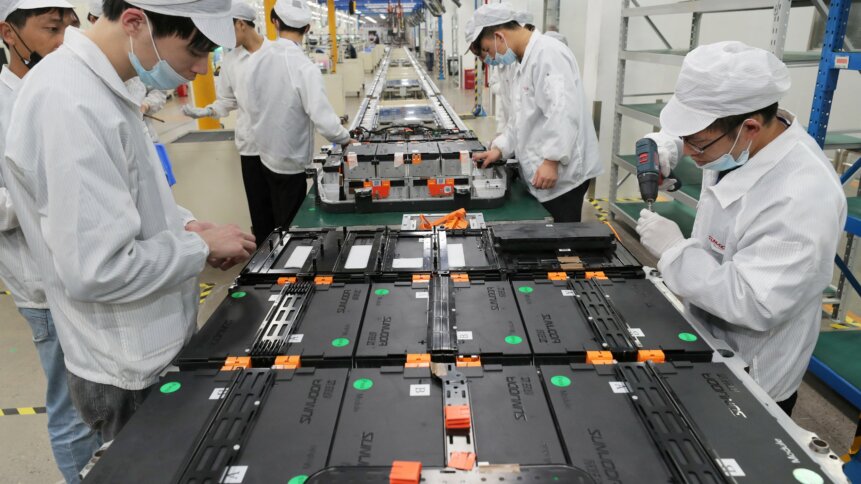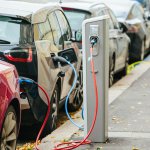Is the world ready for millions of incoming used EV batteries?

- Used batteries will be a bigger environmental burden in due time, with more EVs expected to be on the roads in the coming decades.
- Industries around the world crucially need regulation over recycling.
Electric vehicles have been around for over a decade now, albeit as a niche market. However, over the last couple of years, governments and carmakers around the world have been ripping up business models and national policies with a common end goal: to have electricity replace gasoline and diesel entirely, very soon. But it comes with a fundamental challenge that is less spoken about — used batteries.
To put it into context, the International Energy Agency (IEA) earlier this year said it is expecting 145 million electric vehicles (EVs) worldwide by 2030. Considering that more carmakers are ramping up efforts to meet international energy and climate goals, the number may just soar even higher.
That also means a large number of new ‘clean cars’ will be hitting the global markets and with that comes a whole lot of batteries. Currently, as per IEA’s data, as of 2019, the number of EVs on the road has swelled to 7.2 million, from only about 17,000 electric cars globally in 2010.
The numbers would also mean that in the next 10 to 15 years, there will be millions of end-of-life electric cars worldwide and by then, recycling plants will need to be ready not only to take in all those batteries, reclaim valuable parts and metals but also to properly dispose of the waste.
For now, it is safe to say that with millions of EVs soon to hit the road, the world isn’t close to ready for their old batteries. What is more alarming is the fact that nothing significant is being done on that front with the exception of certain startups and countries.
What is the problem with used EV batteries?
Although EVs do not release carbon dioxide during their use, their production, and that of their batteries, unfortunately, exert the same toll on the environment as conventional cars. Well, it wasn’t much of a problem when EVs were rare. But now the technology is taking off.
What makes matters more complicated is the challenges related to the recycling of lithium-ion batteries. Basically, when the battery comes to the end of its life, its green benefits fade. If it ends up in a landfill, its cells can release problematic toxins, including heavy metals.
Currently, in Australia, for example, according to Naomi J. Boxall, an environmental scientist at Australia’s Commonwealth Scientific and Industrial Research Organization (CSIRO), only two to three percent of Li-ion (lithium-ion) batteries are collected and sent offshore for recycling. In the European Union and the US, the recycling rate is less than five percent.
Are there regulations dealing with EV batteries?
It is not all gloom and doom as some countries are making some effort and something is definitely better than nothing. Take China for example. The country, at the end of 2020, has 4.92 million new energy vehicles (NEVs), including battery-electric, plug-in hybrid, and fuel cell vehicles, operating on its roads.
Being the biggest consumer market when it comes to EVs, China in 2018, imposed new rules aimed at promoting the reuse of EV battery components. At present, the country’s Ministry of Industry and Information Technology (MIIT) requires car companies and battery enterprises to build more than 10,000 recycling outlets nationwide.
Meanwhile, the European Union’s executive branch, the European Commission (EC), at the end of last year proposed a comprehensive regulatory framework for batteries. One of the primary reasons for the proposal is the expected widespread uptake of electric vehicles (EVs) and the associated increase in the use of batteries. It is expected to be finalized end of this year.
New standards for secondhands
To date, there have been no widely accepted standards for evaluating used EV batteries despite it being the single most expensive component in an EV, accounting for about 30% of its cost. Fortunately, Nikkei Asia recently reported that “over 100 companies and business groups, including Ford Motor, BMW and Japanese parts maker Denso, have agreed on common standards for evaluating and pricing used electric vehicle batteries.”
The move is seen as a step to drive the secondhand market for EV batteries, or to an extent, used EVs. Developed by the Mobility Open Blockchain Initiative, the standards are expected to be commercially available by next year. Other MOBI members include Honda Motor and Japanese trading house Itochu, as well as the European Commission.
This could also mean that the standards may be applicable globally. As per the report by Nikkei, under the standards proposed by MOBI, how it will be done is that an individual EV data will be recorded using blockchain technology, including age, mileage, changes in battery temperature, and battery voltage. “This data is then used to evaluate the state of the battery and come up with a monetary value,” it said.
The race to turn the entire ecosystem green
At this point, in the rush to embrace greener vehicle technology, the issue with used EV batteries is slowly becoming a bigger and more significant existential threat. Perhaps well-functioning recycling industries can be a good start and to anchor that, the right legislation around the world is necessary.
There is no better time than now to tackle these problems as the automobile industry is transforming itself at large scales. The right investment is important to ensure a sustainable new ecosystem that goes beyond the cars themselves. Every aspect of an electric vehicle is equally as important and in this case, the batteries.










